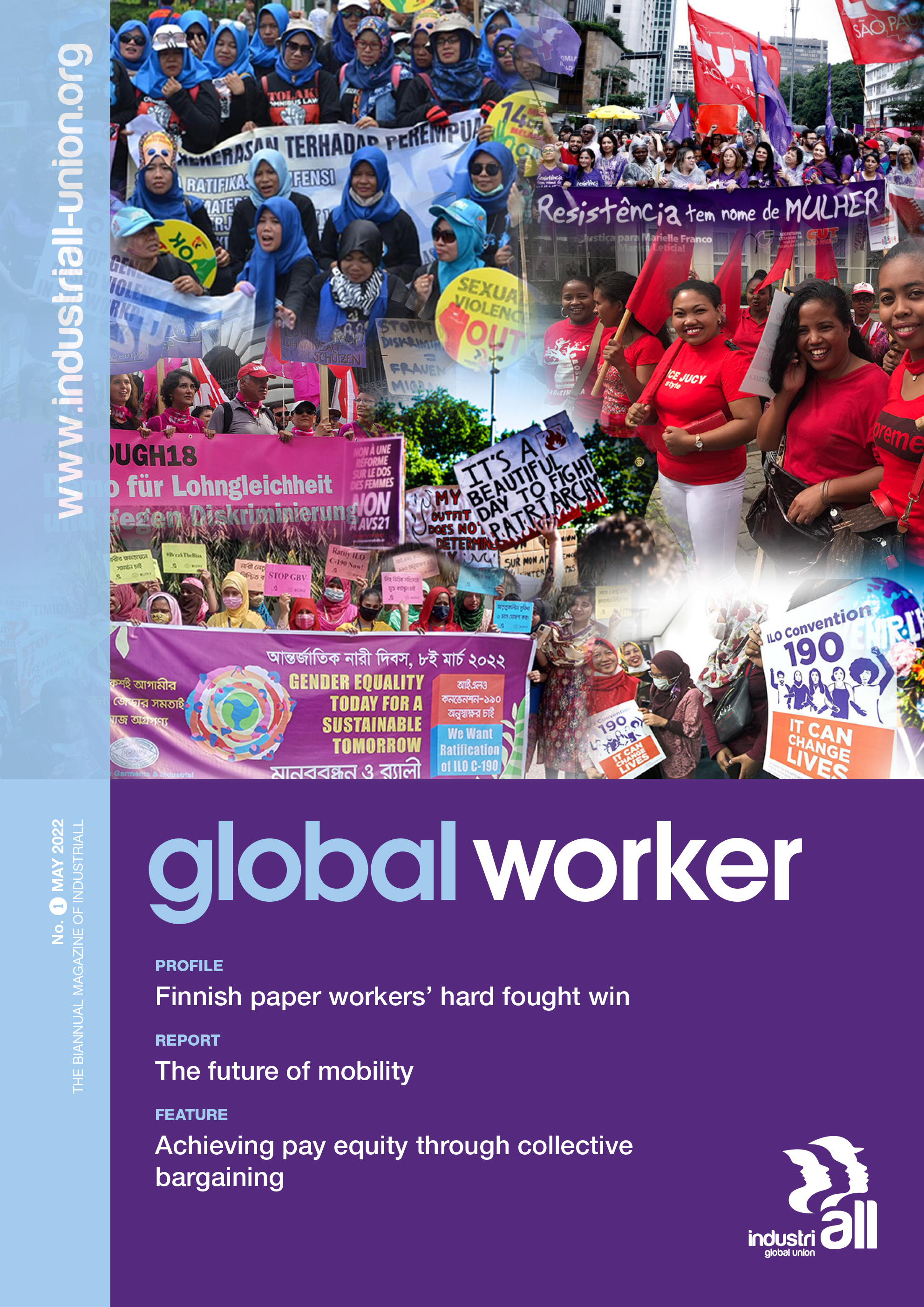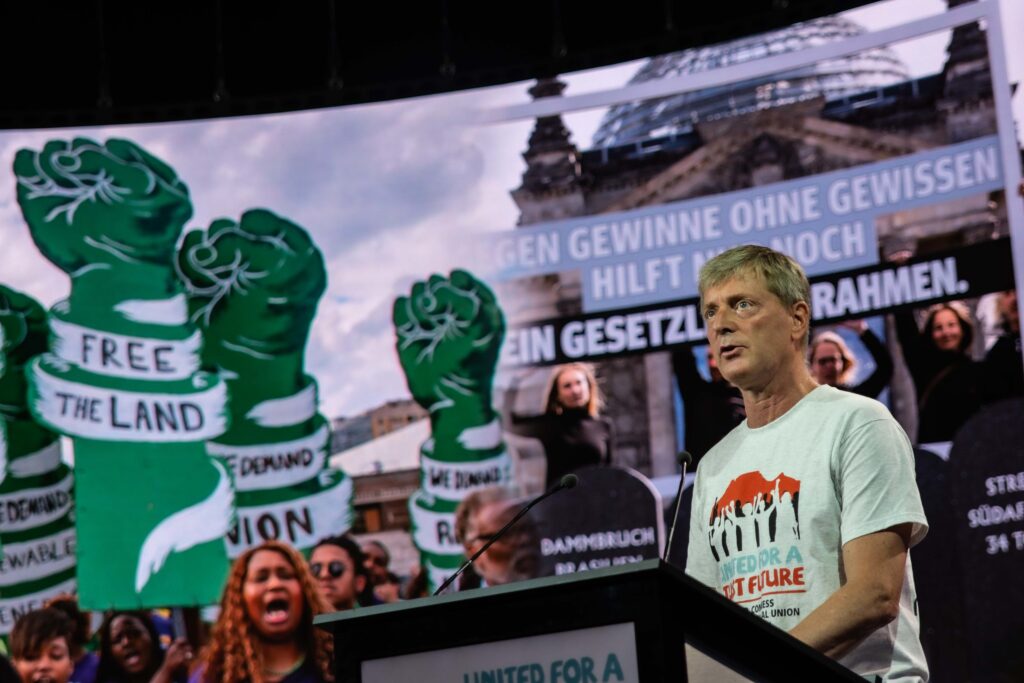1 June, 2022At IndustriALL’s 3rd Congress in September 2021, Atle Høie was elected general secretary. Høie, originally from Norway, had already been part of IndustriALL’s leadership team for five years, as he was elected assistant general secretary at the Rio Congress in 2016.
INTERVIEW From Global Worker No 1 June 2022 | |
 | INTERVIEW: Atle Høie Text: Petra Brannmark |
How did your trade union career start?
“I worked at Norway’s trade union confederation LO after I finished university. After a few years as advisor on European affairs and sustainable development, I moved to Fellesførbundet as international secretary. At the time, Fellesførbundet was affiliated to several global union federations; ITGLWF, ICEM, IMF. I started attending executive committee meetings in all three federations in the 1990s.”
You were elected assistant general secretary in 2016 and then general secretary in 2021 – what made you decide to run?
“I was very active in the process of merging IMF, ICEM and ITGLWF into IndustriALL. I was on the motions committee at the Congress in Vienna in 2005 when the first resolution on the merger was passed.
“Ahead of IndustriALL’s Second Congress in Rio in 2016 I felt I wanted to continue to be active, but on a different level. I truly believe that IndustriALL is the right construction and I want to contribute to the work.
“After five years as assistant general secretary, I saw that changes were needed, changes I could help implement. I ran as general secretary on creating a more transparent and inclusive organization. We want everyone to feel involved and to feel responsibility for the action plan.”
What are your priorities?
“My main priority is to create the infrastructure needed so that IndustriALL can deliver. It sounds technical, but the whole organization, including the head office in Geneva, the regional offices and the affiliates, need to be united behind strategies and implementation.
“This means that we need to change the way we operate. We need to be more open and have more in-depth deep discussions in our Executive Committee and with our affiliates. To achieve results we need everyone onboard, and for that people need to feel that they have ownership.
“The biggest and most important task for IndustriALL is to deliver the infrastructure, basic trade union rights; the right to organize and to collective bargaining. That provides workers with the foundation for everything else, like safe workplaces and freedom from discrimination.”
How will the organization achieve this?
“Employers and governments must be forced to implement the right to organize and to bargain collectively. Everything we do must have these fundamental rights in mind – we must focus on capacity building, help unions reach out to their members, secure companies’ acceptance of unions, ensure that the right to organize is on the agenda at ILO CAS, in the OECD, the international financial institutions, the WTO, everywhere where trade and industry is discussed.
“Currently, we do a lot of firefighting, both in terms of individual cases and violations of country legislation. We get messages every day that workers’ rights are violated. We then contact the owner of the factory, the company that sources from the factory, the government to make sure legislation is complied with, and we call on international support. To know that people outside of your country are aware of your case and that pressure is being put on the employer makes a difference.
“Congress sent a clear message that we must move towards binding and enforceable agreements. Together with UNI Global Union we have developed an arbitration mechanism through the Hague tribunal which is included in the International Accord. It can be applied in other agreements as well, and we will try to implement it into our global framework agreements. We need to make use of the instruments available and be involved in creating new ones, like the International Accord – something no one would have thought possible ten years ago.
“We have to help people understand how important it is to be a member of a trade union, to join forces and stand up to employers and governments. Through the projects IndustriALL runs, we do an enormous amount of capacity building. In the last Congress period, 75,000 of our members were involved in 1,000 activities on collective bargaining, women, health and safety and youth. Participants go back to their workplaces and use what they have learned and have the possibility to help colleagues to improve. And through the projects we have organized 680,000 new members.”
Has Covid changed IndustriALL’s strategic goals?
“The strategic goals are as important as ever, but in the wake of the wage theft in the garment industry for example, the need for global social security has become more obvious.
“People in countries with a social security system came through the pandemic fairly well. However, in poor countries, poor people became poorer when they were thrown out on the streets from one day to the next as workplaces closed. Migrant workers couldn’t get back home as public transport was shut down.
“The current supply chain model is built on cheap labour and avoiding responsibility; taking production to countries with no labour rights and little social protection. Without social protection, societies fall apart. Social protection is a public issue, but until that is a reality, we need to work with companies on how to push for social security in their production countries. We need bridging solutions, as it is will be very costly for poor countries to set it up.
What are IndustriALL’s greatest challenges ahead?
“The greatest challenge for unions it is to make themselves attractive for the workers for tomorrow. Big workplaces with 1,000 people are probably not the workplaces of tomorrow; they will be smaller and more prone to fast changes. People are increasingly individualistic and what attracted people 50 years ago won’t be the same tomorrow.
“This is an important discussion to have, as affiliates need to adapt, and we can support. The action plan asks us to change the world. This can obviously not be done by the secretariat alone, it has to be done together with the 50 million people we represent.”
